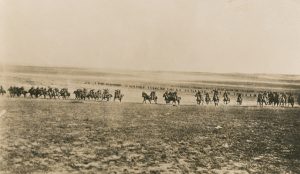
The fighting was fierce, and the Turks doggedly held on to the town. General Edmund Allenby ordered that the town be taken by nightfall, so it was decided to carry out a surprise attack by using Australian Light Horsemen to charge the Turkish defences.[2]
The 4th and 12th Light Horse Regiments, from the 4th Light Horse Brigade, attacked the Turkish positions, riding out in the open, in a heroic cavalry charge which could have seen them decimated by Turkish machine guns and rifle fire. However, the Turkish defenders were surprised by the speed of the attack, and the Light Horsemen soon arrived at the outskirts of Beersheba, having taken relatively few casualties (31 killed, 36 wounded).[3]
The Light Horsemen rode past, or jumped over the Turkish dugouts and trenches, and went straight into Beersheba; some turned around and attacked the Turkish positions from the rear (or just rounded up those Turks who began surrendering).
General Allenby reported that “at 1600 the 4th Australian Light Horse Brigade moved forward to attack Beersheba. The brigade galloped over successive lines of trenches in the face of severe machine-gun and rifle fire, and succeeded in occupying the town by about 1800.”[4]
Beersheba was captured, and the charge of the Australian Light Horsemen was recorded as one of the last great cavalry charges in military history (although, not the last one, as some may think).[5]
A German staff officer, who was captured at Beersheba, said that when he saw the beginning of the charge he thought it was just a feint, “We did not believe that the charge would be pushed home. That seemed an impossible intention. I have heard a great deal of the fighting quality of Australian soldiers. They are not soldiers at all; they are madmen.”[6]
In modern times, the event is commemorated annually, on the 31st of October, as the Battle of Beersheba Day.
See also: The Battle of Beersheba
A list of articles about the Battle of Beersheba.
References:
[1] J. R. French, Capture of Beersheba: A real Australian charge: Graphic details from Trooper French, The Gippsland Times (Sale, Vic.), 11 February 1918, pp. 3-4 [mentions the capture of Austrian and German officers]
“Battle of Beersheba (1917)”, Wikipedia
[2] Nicole Brangwin, “100th anniversary of the Battle of Beersheba”, Parliament of Australia, 27 October 2017
Anzacs’ achievements: Cavalry and Flying Corps eulogized: Lord Allenby’s tribute, Geelong Advertiser (Geelong, Vic.), 13 January 1926, p. 1
[3] “The charge of the 4th Light Horse Brigade at Beersheba”, Australian War Memorial (Canberra), 30 October 2007
“Beersheba: The charge of the 4th Light Horse, 1917”, Australian War Memorial (London)
“The Battle of Beersheba”, Queensland Government
A Brief Record of the Advance of the Egyptian Expeditionary Force under the Command of General Sir Edmund H. H. Allenby G.C.B., G.C.M.G., July 1917 to October 1918 (2nd edition), London: His Majesty’s Stationery Office, 1919, pp. 2-3
[4] A Brief Record of the Advance of the Egyptian Expeditionary Force under the Command of General Sir Edmund H. H. Allenby G.C.B., G.C.M.G., July 1917 to October 1918 (2nd edition), London: His Majesty’s Stationery Office, 1919, p. [132]
[5] The charge at Beersheba was “one of the last great cavalry charges”, but not the last one in military history, nor even the last one of the First World War; for instance, there was the British cavalry charge at Huj (in Palestine), on 8 November 1917, by the Warwickshire Yeomanry and Worcestershire Yeomanry.
See: 1) Peter Rhodes, “Centenary of last classic British Army cavalry charge”, Worcester Observer, 26 November 2017
2) Keith Gaff, “Beersheba – the last great cavalry charge in history?”, The Melbourne Legacy Bulletin, October 2017, pp. 1-2
[6] “Chapter XXIII – The Battle of Beersheba” in: First World War Official Histories: Volume VII: The Australian Imperial Force in Sinai and Palestine, 1914-1918 (10th edition, 1941), p. 404, Australian War Memorial (Canberra)
Further reading:
“Attack on Beersheba”, Australian War Memorial (Canberra)
Claire Hunter, “‘To think I can never see that face again is almost too much to bear’”, Australian War Memorial (Canberra), 30 October 2017
Robyn Van Dyk, “Edward Cleaver died from wounds at the charge of Beersheba 31 October 1917”, Australian War Memorial (Canberra), 13 April 2007
“Battle of Beersheba”, ABC News
“The Battle at Beersheba”, The Australian Light Horse Association
Jack Davies, “An account of the charge at Beersheba: A personal account of the charge in a letter by Colonel Jack Davies MC OC, B Squadron, to his brother Reg, dated at Belah 29/1/1918”, The Australian Light Horse Association
“Beersheba Day 2019”, The Australian Light Horse Association
“The controversial photo of Beersheba”, The Australian Light Horse Association
Guy Barnett, “Talking Point: Light horsemen great heroes of legendary story”, The Mercury, 31 October 2017
“World War One – Battle of Beersheba”, City of Parramatta
Paul Daley, “Beersheba centenary: Let’s remember that story is not the same as history”, The Guardian, 30 October 2017 [a critical look at the story of the Battle of Beersheba]
David López Cabia, “La épica carga de caballería Australiana en Beerseba”, David López Cabia, 28 November 2017 [in Spanish]
“Battle of Beersheba (1917)”, Wikipedia
“4th Light Horse Brigade”, Wikipedia
My husband’s Grandfather, Victor Neville Brady, wrote a newspaper article for the Brisbane Courier in February 1918 about the battle at Beersheba, it was published. Victor had four children: Neville was a pilot shot down and killed in WW2, two daughters Ailsa and Wanda my husband’s mother, and youngest son Keith became a doctor.. thank you. Louise Sinclair-Smith.
Hi Louise. Thank you for sharing that information about your husband’s grandfather.
Victor Neville Brady’s story has now been republished on the IAC site: https://www.australianculture.org/capture-of-beersheba-victor-brady-1918/
His letter was published in three newspapers. Usually we would publish the earliest copy, but in this case a later copy was used, as the version published by The Week (15 February 1918) included some extra text which did not appear in The Brisbane Courier (9 February 1918); the longer version was the one chosen for republishing.
Regards, Ed